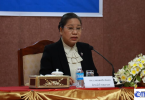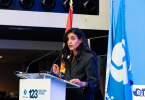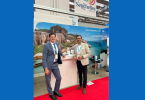“The Safe Travels Stamp by WTTC and the Safer Tourism Seal by Rebuilding Travel are complementary and not in competition,” says Alain St. Ange, current candidate for president of Seychelles, former minister of Tourism, and president of the African Tourism Board.
Travel safety depends on both, the provider and the receiver, and it takes leadership. Recognizing this fact, Rebuilding Travel has created the
- The Safer Tourism Seal
- The Safer Tourism Award
- The Safer Tourism Pass
African Tourism Board‘s head of the Safety and Security Committee, Dr. Walter Mzembi, commented after yesterday’s Ministerial round-table that Africa has 55 countries, 55 destinations, 55 brands and this remains a challenge. If some of the brands are not performing they pose a collateral liability to the rest and pull others’ efforts back.
Mzembi continued: “Destinations now need to authenticate their journey of recovery with an endorsement from reputable stakeholders, including rebuilding.travel Safer Tourism Seal and WTTC and its Safe Travels Stamp. It will boost market confidence in source markets.
Kenya has led by example by adopting both the seal and the stamp. The reality is – source markets are heterogeneous and no single endorsement may satisfy the anxiety of markets and questions about Africa, the more the merrier as long as the integrity of the product is the underlying factor, as we are dealing with lives here.
All of this is not only true for Africa. Nigel David., Regional Director and WTTC Ambassador, told the ministerial round-table organized by the African Tourism Board (ATB) yesterday, that the stamp had been awarded to more than 90 destinations. Rebuilding.travel the issuer of the Safer tourism Seal has members in 117 countries. In reality, both systems complement each other and should be equally attractive for any destination and stakeholder.

WTTC Safe Travels Stamp
WTTC states about the Safe Travels Stamp: “WTTC alongside our Members, governments, health experts, and other industry associations are working together to achieve effective recovery protocols by developing meaningful action plans that optimize sector-wide recovery efforts.
“Part of our protocols includes providing the public & private sectors with the insights & tool kits for interaction & implementation to ensure that people are and feel safe, however WTTC, our members and the sector can not guarantee 100% safety. It is paramount to have common rules. Ultimately, we envision a future of travel that is safe, secure, seamless, and provides an authentic and meaningful experience to the traveler across the journey; one which supports the livelihoods of millions and contributes to sustainable economic growth.”
“The WTTC Safe Travels Stamp is an excellent initiative by a travel member organization. Even though the word safe travels could create liability,” the WTTC CEO Gloria Guevara told eTurboNews, “The Stamp was never a certification, but a pledge based on self-assessment of well-researched protocols. WTTC put such protocols together for many segments of the industry. In pledging to WTTC to follow such protocols the recipient qualifies to show the Stamp.”
“We at rebuilding.travel added a number of options for our Safer Tourism Seal,” said Juergen Steinmetz, a founding member of rebuilding.travel. Steinmetz is also the CEO of the Travel News Group, owner of eTurboNews, and a member of the Executive Committee for the African Tourism Board.
Steinmetz says: “Same as the WTTC stamp, our seal is based on self-assessment and is not a certification. Same as WTTC, our seal is complimentary. Anyone endorsing approved guidelines, including the WTTC pledge, the TUV initiative in Germany, the initiative by Seychelles, Turkey, Spain, or Jamaica for example, will be approved for the Safer Tourism Seal. The basics of course is following the guidelines given by the World Health Organization is another qualifying factor.”
“We are not competing with WTTC, we are complementing WTTC and other initiatives. With our members in 117 countries participating in discussion facilitated by our rebuilding.travel events everyone can learn from all others. It’s a communication that WTTC had been a part of.”
“You don’t have to be a member of any organization to participate. We welcome all leaders and those concerned with the travel and tourism industry.”
Here are some of the additional options that come with the Seal.
Evaluation:
The Safer Tourism Seal offers a voluntary evaluation by experts. This evaluation is done after a detailed interview and a 50-point discussion.
Here is part of the evaluation written by Dr. Peter Tarlow from Safer Tourism in response to the application for the seal by the Ministry of Tourism Kenya:
The Hon. Najib Balala received this award in a special session on livestream.travel published around the world.
The Kenyan Ministry of Tourism in discussions with Rebuilding Tourism has demonstrated that it understands that tourism surety involves training, education, investments in software, and the understanding that security/surety is not a simplistic discipline. In an age of great change and challenges ranging from issues of health to security the Kenyan ministry of tourism has demonstrated that it accepts the fact that its tourism personnel will have continual training and must be flexible enough to adjust their procedure to a constantly changing environment.
The ministry has indicated that it has involved itself in creating a safer tourism product and one that demonstrates to the visitor that the nation is doing everything possible to create a safe, secure and healthy environment by working with international agencies, by participating in regional agencies such as the African Tourism Board and by interacting with tourism security and well-being specialists.

H.E. Najib Balala, Minister Tourism Kenya, Doris Woerfel CEO, Cuthbert Ncube Chair African Tourism Board (taken Nov 2019 at WTM London)
The Kenyan Ministry of tourism has indicated that it is taking proactive measures to assure visitors of the safest tourism experience possible. The ministry well understands that no one can assure 100% safety and security and that no one shall fall ill. What it can do is provide the best tourism surety measures possible. For this reason, the government reports that:
- It has created and updates it health and surety protocols on a timely and regional basis
- It has implemented realistic health, sanitation, disinfection, distancing, and safety protocols that are both affordable and pro-active
- It is following international social distancing guidelines both for staff and visitors and working to create touchless solutions whenever possible. Te touchless policy also means that whenever possible technology is to be used to decrease physical interactions in hotels, restaurants, places of transportation etc.
- The ministry of tourism understands the importance of providing PPE (Personal protective equipment) throughout the tourism industry. This inclusion is for staff and employees and also for guests upon request. PPE materials are offered free of charge
- The Kenyan Tourism Ministry recommends the wearing of masks when personal interactions mean that people are in situations in which they are less than 2 meters from each other. Masks are used in public transportation and indoor settings
- The Ministry is requesting the frequent washing of hands and the sanitization of hotel rooms and other public locations or apparatuses used by the public.
- The government of Kenya is working to provide hand-sanitizers in accordance to the needs of the public and tourism industry
- The ministry is encouraging all tourism locales and business to install physical separation barriers such as the use of plexiglass and at the same time to be sensitive to the nation’s ecological and climatic needs.
- The government of Kenya through its tourism ministry is paying special attention to transportation hubs such as airport terminals and insists on international transportation centers and business such as airlines to comply with the International Civil Aviation Organization’s “Takeoff: Guidance for Air Travel through the COVID-19 Public Health Crisis”
- The Kenya Tourism Ministry understands that as the situation unfolds or changes that its policies may also have to change so as to protect visitors to the fullest extent possible.
In order to control the COVID-19 pandemic the government announced on August 12, 2020, according to the United States Embassy in Kenya the following additional protocols have been established:
- The cessation of movement order that barred entry into and out of Nairobi, Mombasa, and Mandera counties lapsed on July 7th.
- ·On July 6 the GoK announced that the prohibition against social and political gatherings is extended for an additional 30 days.
- Bars are closed until further notice. There are no sales of alcoholic drinks and beverages in eateries and restaurants throughout Kenya effective July 28th. The closing time for restaurants and eateries was amended from 8 pm to 7 pm as of July 28th, for the next 30 days.
- Places of worship may begin phased re-opening in conformity with applicable guidelines developed by the Inter-Faith Council. As outlined on July 6, guidelines mandate a maximum of one hundred (100) participants allowed at each worship ceremony and must not be more than one hour in duration. In-person worship shall not include congregants under age thirteen (13) years or over fifty-eight (58) or persons with underlying health conditions. Sunday schools and madrassas will remain suspended until further notice.
- On May 16th, movement restrictions were imposed into and out of Kenya through the Kenyan-Tanzania and Kenyan-Somali international borders, with exceptions for cargo vehicles.
These 10 principles as stated above should help to: Assure that the nation meets World Health Organization guidelines and as such ensure a safe experience for visitors/guests and service providers. By doing the above the Kenyan Ministry of Tourism will seek to rebuild national, regional and international trust in the safest tourism experience possible.
There is a $250- $1000 charge for such an evaluation.
The Safer Tourism Award
The Safer Tourism Award is available for personalities to be recognized for their merits in the fight against COVID-19. Award holders have shown extraordinary leadership, innovation, and actions. They go the extra step. Nomination and the award are free.
The personalized Safer Tourism Pass is for travelers
The personalized Safer Tourism Pass is for travelers to accompany the Safer Tourism Seal for travel destinations.
Holders of the Safer Tourism Pass vow to be responsible travelers and to abide by local health guidelines that the World Health Organization and national health departments have put into place. The STP means that the traveler is responsible and vows to protect not only him/herself but also all fellow travelers. STP holders represent the best in travel and demonstrate to the world that safer travel is everyone’s responsibility. There is a $5.00 administrative fee.
Currently, Safer Tourism Seal is working on qualifying dozens of new destinations and stakeholders, so they can proudly show the Safer Tourism Seal.
More information on the seal: www.safertourismseal.com







